Alumnus Interview: Gregory Hall (Composition '86)

What inspired the musical opera Marvelous, your adaptation of L. Frank Baum’s sequel to his Wizard of Oz, The Marvelous Land of Oz?
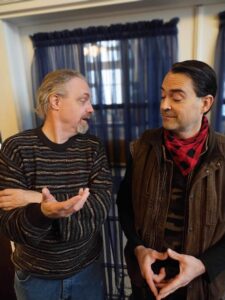 Growing up in the 1960s, the annual showings of The Wizard of Oz were an event widely discussed both at home and school. For that reason, I already had a somewhat sacred sense about the story when, at nine, I discovered the other 13 Baum sequels in a library. Picking up the second book, I quickly paged to the end and read a passage that changed my life: the transformation of the boy Tip into Princess Ozma. Subconsciously, at that point, I think I knew I would eventually have to do something with it.
Growing up in the 1960s, the annual showings of The Wizard of Oz were an event widely discussed both at home and school. For that reason, I already had a somewhat sacred sense about the story when, at nine, I discovered the other 13 Baum sequels in a library. Picking up the second book, I quickly paged to the end and read a passage that changed my life: the transformation of the boy Tip into Princess Ozma. Subconsciously, at that point, I think I knew I would eventually have to do something with it.
In 2021, in the midst of the pandemic, I started Marvelous in book form. It quickly evolved into an opera, one that, as I like to say, “wrote me.” Most recently, noted Oz illustrator Vincent Myrand has become my collaborator, producing a magnificent suite of images to accompany the opera. The story has allowed him as well to develop ideas that have been gestating for decades and further inspires my work.
Could you describe the sound world of this chamber opera? How long has it been gestating?
As I say, it has been in the back of my imagination for decades. In a wonderful coincidence of events, I had recently been playing an electronic piano overlaid with strings during my Glen Campbell tribute concerts with Debby Campbell, Glen’s daughter and collaborator. I had been seeking to use a string/organ piano in my composition since the late 1980s, and for invoking the atmosphere of Oz, I developed a sophisticated instrument for the even sustain of the large chords I was using, something essentially impossible to achieve with en masse orchestral instruments. It’s through-composed (a continuous progression of music without repetition) with a lot of arias, duos, trios, etc.
I talked about this “tallness” of chords with Ned Rorem [(Composition ’44)] at Curtis in the eighties and my obsession with harmony. These sounds are not necessarily imitative of strings but are original electronic sounds that evoke strings yet have a kind of synthesized underbelly that smooths them out in a way you couldn’t get with actual strings. However, acoustic instrumental solos are highlighted against this backdrop, with the flute representing Ozma and the trumpet Tip. Three singers, percussion, chimes, and celesta round out the chamber ensemble.
What led you to collaborate with fellow Curtis alum Merissa Beddows?
My invaluable Curtis contact, Shea Scruggs [(Oboe ’04)], saw Merissa in 2022 on America’s Got Talent singing “Over the Rainbow” and generously put us in contact with one another. She, in turn, took great interest and has been very committed to the project. Her insights and comments have already meant so much in this context.
“I am so excited to perform and collaborate with Mr. Gregory Hall on his “marvelous” new musical opera. He is a brilliant artist and a sincere person. He has been nothing but a pleasure to work with thus far.
“Being a Young Alumni Fund recipient is quite an honor. Curtis has been an integral part of the development of who I am as an artist. I carry the wisdom and knowledge that I gained during my time there with me every day. I am so grateful.”
—Merissa Beddows (Voice ’22)
Ms. Beddows received a $5,000 grant through Curtis’ Young Alumni Fund towards the production of Marvelous. How is that being folded into the creation of this exciting new work?
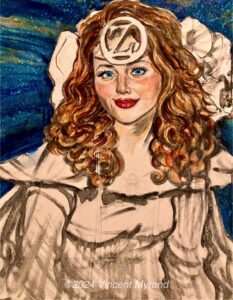 Merissa was able to reimburse herself for the forthcoming performance, and the remainder I am putting into the project towards the premiere at Sistersville Opera (West Virginia) in April 2025. I am most thankful for the generosity of Curtis here and Merissa’s ongoing input (she is, of course, also my soprano.) The other performers are students from Pittsburgh’s Carnegie-Mellon University and include Simon Fletcher, a very fine tenor, and the talented Dayven Martinez as my baritone. I have several other students playing trumpet, flute, percussion, chimes, and celesta, including pianist Marco Cardenas, who is also music director. Jack Brink will be the conductor.
Merissa was able to reimburse herself for the forthcoming performance, and the remainder I am putting into the project towards the premiere at Sistersville Opera (West Virginia) in April 2025. I am most thankful for the generosity of Curtis here and Merissa’s ongoing input (she is, of course, also my soprano.) The other performers are students from Pittsburgh’s Carnegie-Mellon University and include Simon Fletcher, a very fine tenor, and the talented Dayven Martinez as my baritone. I have several other students playing trumpet, flute, percussion, chimes, and celesta, including pianist Marco Cardenas, who is also music director. Jack Brink will be the conductor.
Putting on the entire opera at this point is not quite possible, so I’m personally going to read a lot of narration to fill in gaps during the upcoming concert performance. Vincent Myrand is going to be projecting his amazing images on a huge screen in the Gaslight Theater in Sistersville, West Virginia.
What circumstances led you to pursue a career as a composer?
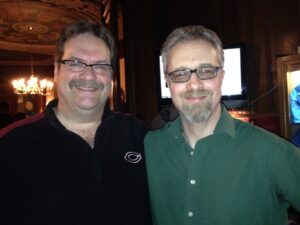 Although I had taken piano lessons since the age of eight, it was when I was 15 that I discovered my great passion for harmony. Before coming to Curtis, if anything I overindulged that passion, often neglecting melody and rhythm, but was always immersed in the study of music, especially the Symbolist/Impressionist eras in France and Russia.
Although I had taken piano lessons since the age of eight, it was when I was 15 that I discovered my great passion for harmony. Before coming to Curtis, if anything I overindulged that passion, often neglecting melody and rhythm, but was always immersed in the study of music, especially the Symbolist/Impressionist eras in France and Russia.
I remember a moment walking into a stereo store in Orinda, California—which is close to Walnut Creek on the way over to San Francisco—when I was living in California. I heard some pop music there, but it was unlike anything I’d ever heard before. It turned out to be an album by Todd Rundgren. He had a 1975 record called Initiation, and it was full of amazing chords, which blew me away. From that very moment, I literally went home and started playing the piano, and I have hardly stopped since.
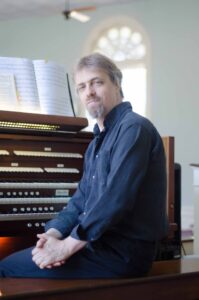 At the age of 18, I started writing music because I just didn’t find the music I wanted. I’ve looked back at my works—a number of which are on commercial CDs, with many other performances—and I see a desire to have these tall, standing chords everywhere, but I just hadn’t quite put two and two together. So, in ’78, I became a composer and was so blessed by Ned Rorem because, thanks to him, I got into Curtis. I had already received my bachelor’s degree from UC Santa Barbara, where I studied with the late composer Emma Lou Diemer. I knew I wanted to study with Mr. Rorem, so I applied only to Curtis, and they accepted me. He taught me so much.
At the age of 18, I started writing music because I just didn’t find the music I wanted. I’ve looked back at my works—a number of which are on commercial CDs, with many other performances—and I see a desire to have these tall, standing chords everywhere, but I just hadn’t quite put two and two together. So, in ’78, I became a composer and was so blessed by Ned Rorem because, thanks to him, I got into Curtis. I had already received my bachelor’s degree from UC Santa Barbara, where I studied with the late composer Emma Lou Diemer. I knew I wanted to study with Mr. Rorem, so I applied only to Curtis, and they accepted me. He taught me so much.
Writing art songs has always been extremely important to me, which is why I was drawn to Rorem. It’s almost hard for me to listen to instrumental music at this point, as I’ve kind of given up interest in it. I really only want to write opera or art songs. The voice is extremely important to me. When it comes to composition, I adopt a perspective similar to Bach’s. He made the vertical element—the harmony—and the horizontal element—the melody— equivalent. That’s what I’ve striven to do, both unconsciously and now very consciously, to make music as interesting vertically as it is horizontally.
Tell us about your time here at Curtis. Share with us some of your fond memories on stage and in the classroom at the school. How did your studies at Curtis shape the trajectory of your career as a composer?
To follow on from the last, it was a life-changing experience to be accepted to study at Curtis by a composer (Ned Rorem) who was already a major influence on my work. I experienced the most important compositional growth of my career, as he gave me a very disciplined sense of how to integrate and shape melodic structures into my works, which, of course, was exactly what I needed.
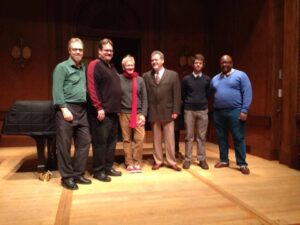
When I applied here, I only submitted a few piano works. I was still exploring compositional textures because I came to it late. I was a harmonic composer, writing things in block chords. He realized this immediately because he obviously loved harmony as well. There are exquisite harmonies throughout all his works. The first thing he said was, “We’re taking about a year just to have you write simple melodies.” He tore my work apart, but it really helped give me a strong melodic sense.
I remember a brief orchestral work of mine done at Field Concert Hall in 1984, which subsequently received a mention in Mr. Rorem’s Nantucket Diary. Several musicians who remain dear friends and colleagues of mine to this day were fellow Curtis students. I remember with great fondness the diligence Dr. Loeb applied to his theory classes and compositional workshops, as well as the humor and discipline of Dr. Lallerstedt’s classes and the patience with which Marion Zarzeczna navigated my demands to play contemporary piano works for her lessons.
I have explored many different kinds of music-making during my career, playing for classical and pop ensembles and composing for the former. I have explored algorithmic and electronic music, classical improvisation through sight reading—for which I have developed a series of templates for soloists and ensembles—and now opera. More than any other external force, the validation and training I received at Curtis—I can honestly say—has given me the confidence to go forward not only with traditional composition but with my other experiments and even storytelling, which is now an integral part of the creation of my opera libretti.
Interview with Gregory Hall by Ryan Scott Lathan. This interview was edited and condensed.
ABOUT GREGORY HALL
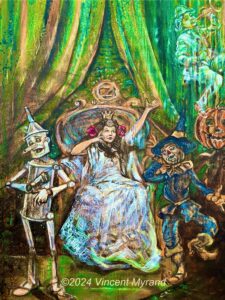 Composer Gregory Hall holds a B.A. in music from UC Santa Barbara (1982), and a composition degree from the Curtis Institute of Music (1986), where he studied with Ned Rorem. He is a fellow of the Ucross Foundation.
Composer Gregory Hall holds a B.A. in music from UC Santa Barbara (1982), and a composition degree from the Curtis Institute of Music (1986), where he studied with Ned Rorem. He is a fellow of the Ucross Foundation.
He has participated in concerts by the ACA, SCI., Maine Arts, Gamper Festival, and SEAMUS. In 1991 he received a commission for the Hardanger Trio from the MTNA, and again in 2013 for The Four Ranges. Mr. Hall was selected as “Maine Composer of the Year” in 1997 for the Gamper Festival. Arkadia was commissioned in 2000 by the Arcady Chamber Orchestra. Mr. Hall’s Water: 2 Poems of W.S. Merwin for Soprano and Orchestra appears in Vol. 15 of ERMMedia’s Masterworks of the New Era. Parma Recordings released his Variations on Ongiara on the CD Harmonious Dissonance, and his Quartet for Saxophones on the album Quartet at the Crossroads, and the solo CD Compositional Improvisations From The Mysteria.
Mr. Hall’s recordings and works have been reviewed numerous times: in the New Music Connoisseur, the New York Times, the American Record Guide, MusicWeb International, as well as the Portland Press-Herald (Maine). His fascination with songwriting—and combining contemporary opera and musicals—has resulted in his chamber musical opera Marvelous, based on The Marvelous Land of Oz, which is the sequel to The Wonderful Wizard of Oz by L. Frank Baum.
Visit Gregory Hall’s official website HERE.
Photo credits: 1.) Portrait of Gregory Hall; courtesy of the artist. 2.) Mr. Hall with Oz illustrator Vincent Myrand, courtesy of the artist. 3 & 7.) Illustrations for Marvelous, including Merissa Beddows as Ozma, by Vincent Myrand. 4.) Alumnus William Coble and Gregory Hall at Curtis; courtesy of the artist. 5.) Photo at Field Concert Hall, Curtis Institute of Music in May 2014 for Ned Rorem’s 90th birthday concert (L-R): Gregory Hall, William Coble, Dr. Ford Lallerstedt, Troy Peters, Eli Marshall, and Jonathan Bailey Holland; courtesy of the artist. 6.) Mr. Hall at Wells Congregational Church in Wells, Maine; courtesy of the artist.


